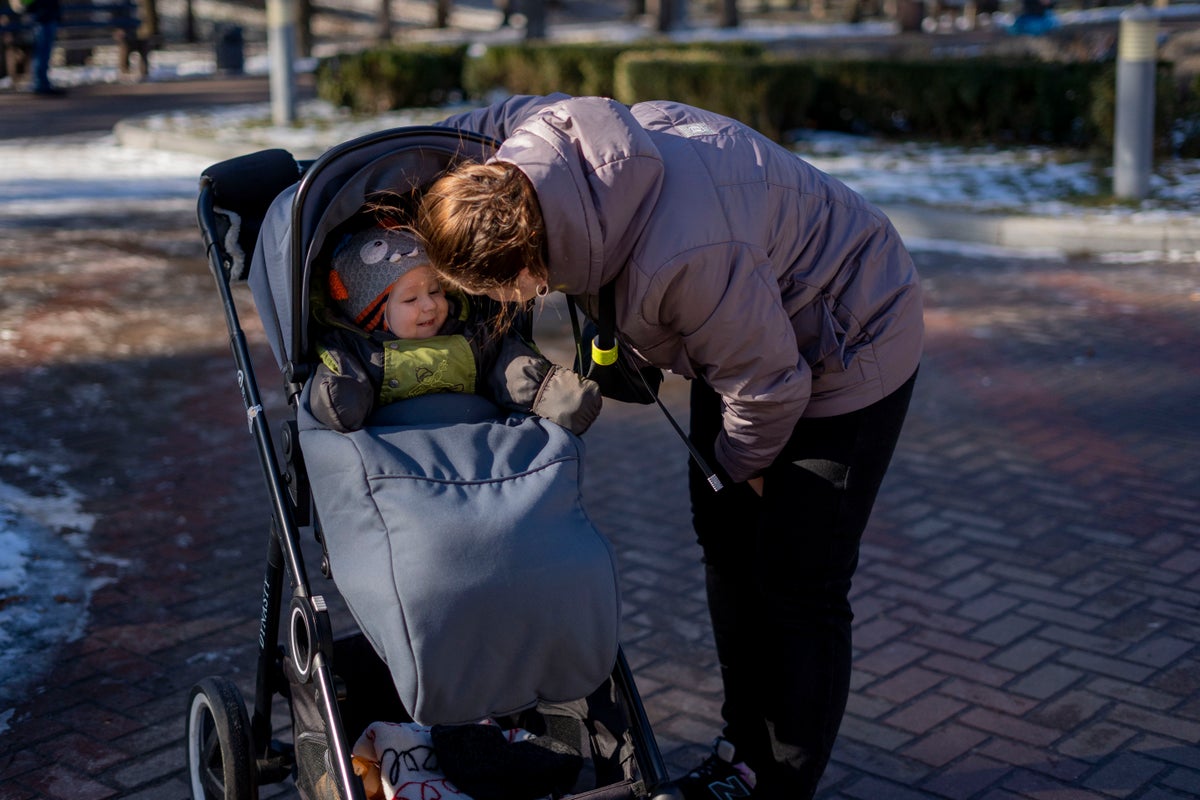
Anastasiia Morhun knew having a baby would change her life. She prepared rigorously, read up about newborns and daydreamed about the kind of parents she and her husband would be. But there was no way to be ready for the war that Russia unleashed against her country Feb. 24, 2022 — the day she gave birth to Roman.
“In one moment, everything was ruined,” Morhun said.
Instead of quiet first moments between mother and newborn, Morhun and Roman spent their early time together in the maternity hospital bomb shelter, as air raid sirens howled and missiles struck across Ukraine. Morhun was in pain from her cesarean section. It was, she said, “one long, long dark day.”
“I was learning to be a mother," Morhun, 29, said. “But it was actually much easier than accepting the reality of war.”
The 24th of February is forever etched in the collective consciousness of all Ukrainians — and for women who gave birth and men who became fathers as the bombs began to fall, the day holds especially complicated emotions.
Bringing forth life just as the Russian onslaught started to snatch other lives away gave rise to both joy and terror — a sour-sweet mix for brand-new parents. When they blow out their kids' first candle Friday — and on all birthdays in years to come — other Ukrainians will be lighting candles for the dead.
Of the past 365 days, Morhun said: “It’s been a very difficult but very happy year for me."
She counts herself lucky: Roman is healthy and seems so far untraumatized. Morhun herself, however, hasn't shaken off dark memories of his first days, particularly a missile attack that struck an apartment close to their maternity center in the capital, Kyiv, two days after his birth.
“That was the first time I felt truly scared,” she said. "You just grab your child and run to the basement.”
Alina Mustafaieva, 30, became a first-time mom when her daughter, Yeva, was born as first explosions echoed across Kharkiv, Ukraine's second-largest city, close to the eastern border with Russia.
“We saw a glow looming over the city,” she said. As nurses were checking Yeva, she forced herself to think positive thoughts, refusing to let the war destroy her magic moment.
“I gave birth to my Yeva, and I wanted to be happy about it," she said.
Mustafaieva is so conflicted about Friday — a birthday for Yeva, a tragic anniversary for Ukraine — that she has decided to move her daughter's celebrations back a day, to Saturday. Her 1-year-old will be feted with a party, a photo booth, cake, balloons and a puffy dress.
Her mom wants Yeva to celebrate an “ordinary” birthday, as children not born that painful day do.
“It’s a tragedy for the whole country, for every Ukrainian,” she said. “My family was lucky, we didn’t lose anyone or anything. But many did, and we have to share this loss together."
Curious and playful, Yeva is now crawling, roaming on all fours around Mustafaieva's apartment. That brings joy, but also a fresh set of worries when explosions ring out. Mustafaieva instinctively pulls Yeva away from the windows. She hopes Yeva is too young for any bad memories to stick.
“I don’t think she’ll remember everything she went through with me. All those escapes, long trips, hiding in the bomb shelter or even the blasts,” Mustafaieva said. “But when she grows up, I will tell her everything in detail. I will be this type of parent who will explain to children what the Russian Federation represents.”
Although parents hope that invasion-day babies won't be scarred by their first year of life, they can't help but associate their toddlers' early milestones with bloodshed and fear.
Anastasiia Havryshenko gave birth to her second child, a boy, shortly after midday Feb. 24, at a maternity center in Sumy, another city repeatedly struck in the northeast.
She's haunted by how different Artem's birth was from that of her first child.
She felt helpless and burst into tears as she, the doctors and other mothers sat out an attack in a basement. She thought to herself: “I didn’t give birth to him so he had to hide in the bomb shelter."
“I knew it wasn’t supposed to be like this. It was not normal and psychologically, very tough. Very tough," she said.
She remembers Artem’s first outdoor walk. The city streets were empty, most shops closed, but she wanted him to breathe fresh air. After 10 minutes outside, sirens blared. She heard a plane and saw people running into basements. She hurried back with Artem to her apartment.
Back inside, an explosion shattered windows and doors. Power and water went out. She hugged Artem, crying helplessly with him on their sofa.
"All I wanted was to understand why it was happening to us. What had we done wrong?” she said.
A year on, she's adapted as best she can, staying with her husband in Sumy and refusing to join the millions of refugees who have had to uproot in search of safety elsewhere. Like millions of other Ukrainians, she's learned survival skills to cope with power outages caused by Russian bombardments. She cooks whenever electricity comes back on and maintains stocks of bottled water.
“We have just one life, so we need to move on, hope for the best, and to give what we can to our children,” she said.
Humor helps, too. The family's inside joke is that Artem — born three weeks ahead of his due-date — chose Feb. 24 to pop out his little head.
“We call him ‘general’ because he has a commander's character," his mom said. “He is our general and our young defender. He himself knew when he should be born.”
___
Vasilisa Stepanenko in Kharkiv, Ukraine, and Susie Blann and Inna Varenytsia in Kyiv contributed reporting.






